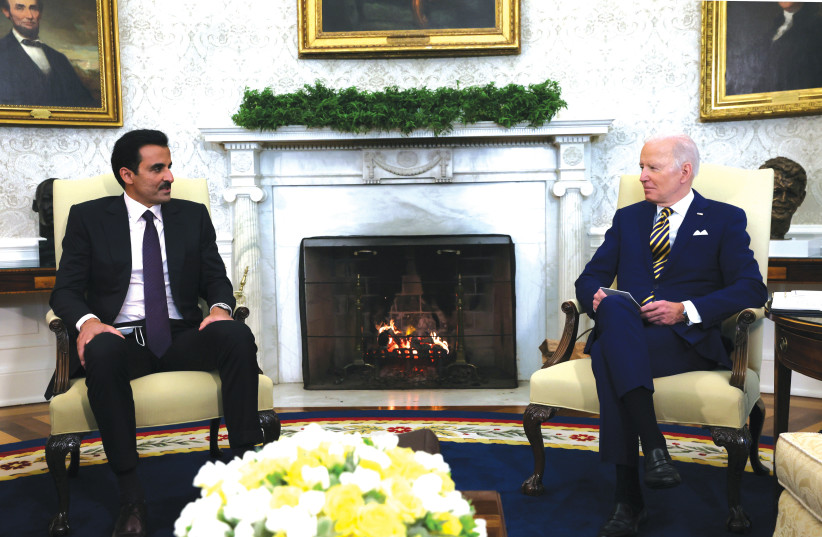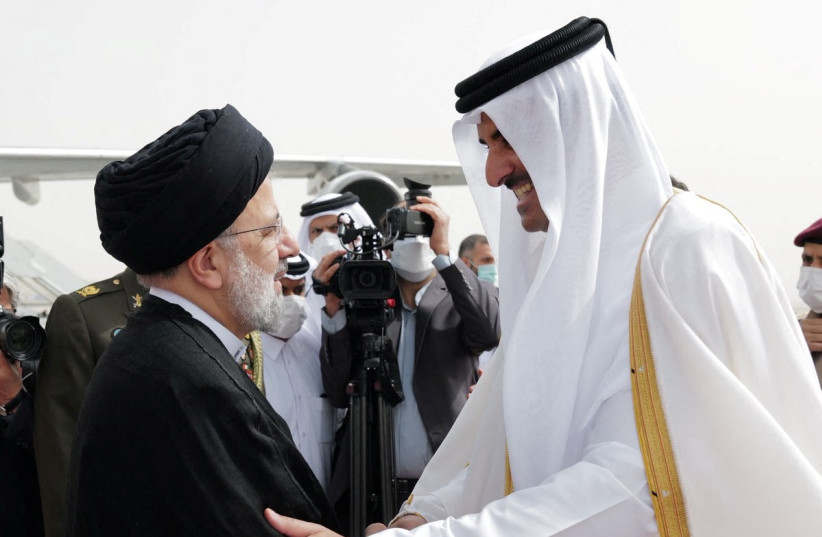The US will need to keep a wary eye on its newest non-NATO ally, as Qatar has long pursued a strategy of backing Islamists – from Hamas in Gaza to hard-line Syrian opposition fighters.

“Major non-NATO Ally” (MNNA) is a US legal designation conferred on nearly 20 countries including Australia, Israel, Japan and Brazil. On March 10, President Joe Biden formally fulfilled his promise to grant this status to Qatar.
The MNNA designation, a powerful symbol of friendship and close collaboration, provides foreign partners of the US with a range of benefits and privileges, especially in the areas of defense, trade and security cooperation. By conferring the designation on Qatar, the Biden administration is signaling it wants an even closer relationship with the Gulf state than it already enjoys.
The actual decision was made at the end of January, during the visit to Washington of Qatar’s sheikh, Tamim bin Hamad al-Thani. With Biden’s announcement, Qatar becomes the third country in the Gulf region, after Kuwait and Bahrain, to become a US major non-NATO ally.
What led to the decision? One factor was the important role played by Qatar in the events leading to the US withdrawal from Afghanistan in August 2021. Collaborating closely with the US, Qatar acted as mediator between the Taliban and what was left of the previous Afghan administration in assisting the evacuation of refugees.
Another consideration must be the current global concern over energy supplies and surging fuel prices following Russia’s invasion of Ukraine. Qatar is among the world’s largest producers of liquefied natural gas (LNG), and could play a vital role if the flow of fossil fuels from Russia were reduced, either through the EU cutting its demand or by Russia reducing its supply.

Yet this elevation of Qatar’s status needed Washington to turn a blind eye to a range of rather dubious activities by the Gulf state. While offering itself as a key US ally, Qatar has long pursued a strategy of backing Islamists – from Hamas in Gaza, to the Muslim Brotherhood in Egypt, to hard-line Syrian opposition fighters. Although the US Air Force had a base at al-Udeid, about 20 miles from Qatar’s capital, Qatar also allowed the Taliban to establish a political office in Doha.
Even before the Afghanistan debacle, Qatar had become recognized as a regional power broker because of its major role in the delicate Israel-Hamas-Palestinian situation in Gaza. Financial aid to the tune of millions of dollars has flowed into Gaza from Qatar over the years. Some of it was earmarked for Gazan families, reconstruction or fuel supplies and was closely audited, but much was provided with too little accountability attached. Media reports suggest that large sums of Qatari money were simply pocketed by Hamas.
Qatar’s wayward policies, especially with regard to Islamist groups, had long infuriated its neighboring Arab states, and on June 5, 2017 Egypt, Saudi Arabia, the United Arab Emirates and Bahrain broke off diplomatic relations with Qatar for a second time, and virtually imposed a trade blockade.
For three-and-a-half years, largely through trade agreements with Turkey and Iran’s ayatollahs, Qatar withstood the worst that the Egypt-led alliance could inflict – and in January 2021 diplomatic relations were restored without any concessions by Qatar, which continued its contacts with Iran, the Muslim Brotherhood and Islamist interests.
THE EMBRACE of Qatar, warts and all, by the US reflects Biden’s desire to deepen economic and security ties with the Gulf state, a desire given instant substance by the announcement by Akbar Al Baker, chief executive of Qatar Airways, of a $34 billion deal to purchase planes from Boeing.
The deal involves Qatar Airways buying the new super cargo plane from Boeing, the 777-8 freighter. Baker called it “the most significant new freighter aircraft for a generation.” White House officials described the deal between the two companies as one of the largest in Boeing’s history, supporting tens of thousands of jobs at Boeing and its affiliated companies.
Brian Deese, director of Biden’s National Economic Council, said in a tweet: “this deal boosts America’s civil aviation industry, promoting greater domestic production capacity, a healthy hybrid commercial-defense industrial base and strong supply chains, while uplifting the hundreds of small businesses that feed into Boeing’s supply chains.”
On the positive side, Qatar has transformed itself into a major diplomatic player and a commercial hub, and is well on its way to becoming a cultural, sports and tourist center for the Gulf as a whole – a position likely to be consolidated when Qatar hosts the FIFA World Cup in the winter of 2022.
Even though Qatar now joins Israel as a major non-NATO ally of the US, there seems no immediate prospect of it following its Gulf neighbors, the UAE or Bahrain, in concluding an Abraham Accord with Israel. Qatar seems unable, as four other Muslim states have done, to normalize relations with Israel while at the same time maintaining its support for Palestinian aspirations.
Sheikh al-Thani is reported as saying that Qatar would continue its “working relationship” with Israel in order to help the Palestinians, but that it seemed to him unrealistic to enter into an agreement with Israel like the UAE or Bahrain “in the absence of a real commitment to a two-state solution.”
Yet he must be aware that supporting a two-state solution is only a tactic, not a real commitment, of his Islamist friends. Al-Thani must know that they would never agree to endorsing Israel’s legal rights in the region, since their true objective is to acquire the whole of Mandate Palestine “from the river to the sea.”
The US will need to keep a wary eye on its newest non-NATO ally.
The writer is Middle East correspondent for Eurasia Review. His latest book is Trump and the Holy Land: 2016-2020. Follow him at: www.a-mid-east-journal.blogspot.com.
Content retrieved from: https://www.jpost.com/opinion/article-701948.